Singular/Plural-Only Nouns

Singular and Plural Nouns
There are certain nouns in English that occur only in the singular form or only in the plural form. Here are examples of nouns that are exclusively singular or plural:
Nouns Occurring Only in the Singular Form:
Progress, information, knowledge, advice, friendship, mathematics, phonetics, news, money, hair, beauty, honey, copper, cement, stone, glass, gold, air, sand, metal
Furniture: “The furniture in the room is modern.”
Information: “I need some information about the event.”
Advice: “She gave me valuable advice.”
Knowledge: “Acquiring knowledge is important.”
News: “The news is shocking.”
In these cases, these nouns do not have a distinct plural form. They are used to refer to a mass or uncountable concept, and we do not typically add an “s” to make them plural.
These Nouns do not use indefinite article a/an or one but can use some, little, a little, a lot of
I gave him some good advice.
He has made a lot of progress this year.
We have little information about it.
The noun news only has a singular form.
What is the news?
The English names of sciences like Mathematics, Phonetics, Physics, and Linguistics are singular and used with a verb in singular form.
Physics is awesome.
The words money and hair have no plural form:
Her hair is white. This money is not enough for purchases.
Fruit has just a singular form: Fruit is very useful
Note: fruits for various kind of
On the table, there are apples, pears, and other fruits.
Nouns Occurring Only in the Plural Form:
scissors, spectacles, glasses, scales, tongs, goods, clothes, pants, contents, proceeds, wages, riches, congratulations, stairs, savings (money), premises (buildings), belongings, outskirts, jeans, tights, jitters, -measles, mumps, diabetes (diseases)
Scissors: “I need to buy a new pair of scissors.”
Glasses (referring to eyeglasses): “She wears glasses to improve her vision.”
Trousers: “He put on his trousers and left for work.”
Shorts: “She wore a pair of shorts to the beach.”
Clothes: “I need to do laundry; my clothes are dirty.”
These nouns are inherently plural and do not have a singular form. They are used to refer to objects that are naturally seen or used as pairs or sets.
People is always used in plural form: There were many people in the hall.
But people-peoples in the sense of nations and folks.
The British people like tea time.
The peoples of the world want peace.
Nouns like “means,” “works,” and “coal” can be used in both singular and plural forms, depending on the context. Here’s how they can be used:
Means:
Singular: “mean” refers to a method or way of accomplishing something.
Example: “Studying is a means to improve your knowledge.”
Plural: “means” can refer to multiple methods or resources.
Example: “He used various means to achieve his goals.”
Works:
Singular: “work” typically refers to a general concept of labor or effort.
Example: “Hard work pays off.”
Plural: “works” can refer to multiple pieces of art, literature, or creative endeavors.
Example: “She has written several great works.”
Coal:
Singular: “coal” refers to the solid, black fossil fuel used as a source of energy.
Example: “He works in the coal industry.”
Plural: “coals” can refer to multiple pieces or instances of coal.
Example: “The fire was stoked with fresh coals.”
The nouns can take both singular and plural forms, and the context of the sentence helps determine which form to use.
Nouns which only occur in singular or plural
Collective and Individual Nouns